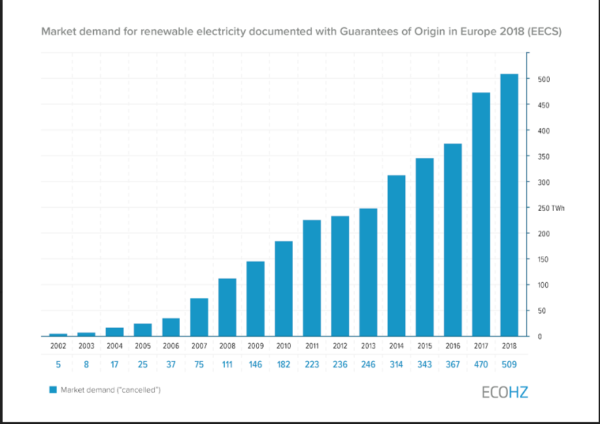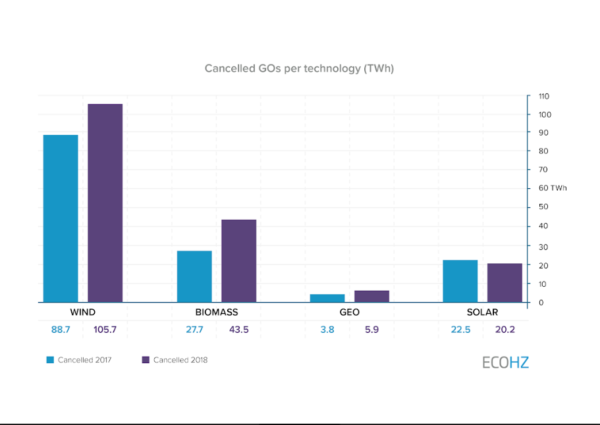Preliminary figures show demand for green electricity in Europe increased 8% in 2018. Although not as impressive as the rise seen a year earlier, demand continued to grow, pushing the price of electricity identified as generated from renewables under the EU’s Guarantee of Origin scheme to new highs.
The reported volume of demand for certified green electricity was 499 TWh, but that number is expected to rise an additional 10 TWh when German fourth-quarter figures are included, according to Norwegian renewable energy consultancy ECOHZ. That would mark a significant rise from 2017’s 470 TWh across EU member states.

“For the first time, renewable energy demand in Europe surpasses 500 TWh – or half a billion Guarantees of Origin,” said Tom Lindberg, managing director of ECOHZ, commenting on the 2018 statistics issued by the Association of Issuing Bodies. “If the growth trend from the last five years continues, the GO-market will soon surpass €1 billion … customers are willing to pay a premium on certain origins of energy.”
The only electricity tracking instrument in Europe, GOs are designed to give electricity consumers the power to choose sustainable power production over fossil fuels, hence signalling their demand preferences. Each GO represents 1 MWh of green electricity.
Main driver
Corporates emerged as the driving force behind Europe’s 2018 renewable electricity demand. On the back of initiatives including WeMeanBusiness and RE100, more corporations saw sustainability as necessary for competitiveness.
ECOHZ added that on the EU level, a new Renewable Energy Directive (REDII) was recently approved with a view to strengthening the GO system by further embedding it in European legislation.
“The GOs are the primary tool in Europe to document the purchase of renewable energy and REDII represents a major step forward in strengthening the system of GOs,” said Lindberg, adding there is no sign growth will subdue this year, especially with the corporate sector moving aggressively towards 100% renewable targets.
Record price levels
Having started the year at around €0.55/MWh, wholesale prices for GOs averaged out at around €1.30 in 2018, with Nordic hydro GOs trading as high as €2.29. According to ECOHZ, that indicates the market is willing to pay higher prices even though demand did not grow as aggressively last year.
With demand for renewable power exceeding 500 TWh – and forward prices set at around €1.30/MWh – it is calculated the annual value of the market will exceed €650 million.
Leading markets
The Netherlands, France, Switzerland and Italy showed record high demand last year. French demand increased from 21 TWh to 33 TWh and Italy saw record demand of 45 TWh, up from 41 TWh.
Although the final numbers have not been published for Germany, they are on track to exceed 100 TWh for the first time, said ECOHZ.
Leading power sources
While hydropower stayed out in front, wind power continued to strengthen. According to ECOHZ, preferences are gradually shifting towards alternative renewable sources to hydro, with wind power “the technology of choice”.

Solar, on the other hand, experienced a 2.3 TWh fall in demand, with Lindberg blaming limited availability in certain periods. “Solar GOs have traditionally been priced higher than alternative renewable technologies, and with GO prices in general reaching record heights in 2018, the slight ‘fall-back’ could be the result of short-term switching to ‘less costly’ alternatives,” he said.
The consultancy boss told pv magazine supply and demand for solar GOs would rise this year, adding: “Critical for increased solar supply are two things: one, increased focus on aggregating solar production from small and medium size installations; and, two, more countries allowing issuing of GOs from solar plants with support schemes. We expect a buoyant demand for solar.”
The GO scheme was introduced under the EU’s Renewable Energy Directive (2009/28/EC), which came into force in June 2009 as part of the bloc’s energy and climate change package.
While the directive states GOs prove energy comes from renewable sources, there have been allegations about their misuse. Greenpeace France has claimed several providers in the country are ‘greenwashing’ by purchasing power from nuclear plants and turning it “green” by using GOs.
This content is protected by copyright and may not be reused. If you want to cooperate with us and would like to reuse some of our content, please contact: editors@pv-magazine.com.




By submitting this form you agree to pv magazine using your data for the purposes of publishing your comment.
Your personal data will only be disclosed or otherwise transmitted to third parties for the purposes of spam filtering or if this is necessary for technical maintenance of the website. Any other transfer to third parties will not take place unless this is justified on the basis of applicable data protection regulations or if pv magazine is legally obliged to do so.
You may revoke this consent at any time with effect for the future, in which case your personal data will be deleted immediately. Otherwise, your data will be deleted if pv magazine has processed your request or the purpose of data storage is fulfilled.
Further information on data privacy can be found in our Data Protection Policy.